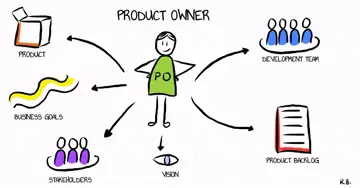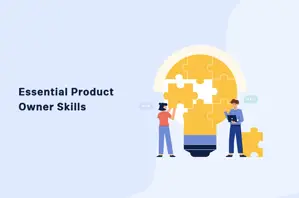A Product Owner is responsible for maximizing the value of the Scrum Team’s product. Particularly, the Scrum team is a small, agile team committed to delivering product increments. Even though a scrum team usually consists of only ten members, it is large enough to finish significant work in a sprint.
The Product Owner, helps the team understand the purpose and vision of a product. The Product Goal serves as the basis for all work, which is then prioritized and developed to offer value to all stakeholders, including users inside and outside the business. Product owners recognize, quantify, and optimize value across the course of a product's lifespan.
When determining the product's need for the development team, the product owner serves as the main point of contact for the client. The client needs in this product backlog will be arranged in order of priority. The Product Owner's job is to define and prioritize the user’s needs.
Besides, the user stories' compliance with customer requirements is the product owner's responsibility. Product owners play a crucial role in organizations eager to transition to agile methods for developing new products. The Product Owner must cooperate and maintain tight relationships with a variety of stakeholders, including project managers, development teams, business executives, and consumers.

Here are some common responsibilities of the Product Owner:
Establishing and implementing the product strategy and vision based on market research and the demands of stakeholders and customers.
Establishing and prioritizing a feature and need list (called a backlog) by the product vision and goals, then iteratively improving it in response to user input and shifting business requirements.
Working together with cross-functional teams (such as quality assurance, developers, designers, and marketers) to ensure the product is delivered on schedule, under budget, and satisfies customer expectations.
Ensuring that the development team has accurately calculated, specified, and comprehended the items in the product backlog.
Handling tough decisions about features to include in each sprint or release, taking into account what each will provide to the business and its consumers.
Serving as the main point of contact for issues about the product for all parties involved, including partners, customers, executives, and other departments.
Monitoring the product's performance continuously, getting input from stakeholders and consumers, and leveraging data-driven insights to prioritize and make choices about future changes.
Keeping up a thorough awareness of new developments in technology, developing trends, and the competitive landscape that might affect the product's success.
Managing any legal or ethical issues about the product and making sure it complies with all applicable laws and standards.
Exhibiting ownership and leadership over the product, motivating others to share and advance the objectives and vision of the product.
Here are the top skills that a Product Owner should acquire:
Technically skilled in many IT fields, product owners can participate more actively in development. Along with communicating specialist knowledge to other team members, they offer technological solutions. A few technical competencies for product owners include:
Development of software
Designing and coding
Architecture for product development
Agile and Scrum development approaches
Principles of user experience
Management of product backlogs
Most product owners communicate with project stakeholders, Scrum masters, and their Scrum teams. They develop and communicate product goals using written, spoken, and nonverbal communication techniques. By providing insights, they can optimize the value of their products and take care of problems early in the development process.
Product owners investigate different problems and, as soon as feasible, come up with practical answers. They recognize, gather, and evaluate data; they apply logic to solve complicated puzzles; and they base their choices on reasoned deductions. Product owners evaluate various products in the backlog using these analytical abilities to determine which should be prioritized according to their unique features.
Product owners make critical decisions that affect the product's success by utilizing their technical, analytical, and communication abilities. This ability is critical to the position in both routine everyday decisions and important ones. Product owners analyze problems, gather pertinent data, discover several solutions, select the best one, put it into action, and assess the outcome.
Product owners frequently oversee bigger teams and depend on efficient collaboration. They support their Scrum team in collaborating toward success and keeping a shared focus to be most effective. To help the team achieve its objectives, the product owner mentors team members gives vision to the group, and negotiates the backlog.
Project management abilities are crucial for product owners, notwithstanding the differences in their positions. These abilities pertain to the team's capacity to apply expertise, particular tools, and other abilities to guarantee that all project objectives are fulfilled inside predetermined boundaries. These abilities are used by product owners to establish a product vision, prioritize and order backlog items, oversee the development process, and conclude the project when it is completed.
While disagreements may always happen throughout a project, it's crucial to handle them so the team can continue on time. Product owners frequently serve as team member mediators to settle personal disputes. By actively listening to all sides, they can use their active listening abilities to settle conflicts involving resources or power dynamics. Since conflict resolution can determine what is required to satisfy the customer, it may also assist these experts in comforting dissatisfied clients.
Product owners are responsible for meeting deadlines since many software projects have time constraints. They assign responsibilities to their team and provide client updates to keep them on schedule. The product owner can collaborate with the customer and stakeholders to find a solution if the team runs into problems that make it difficult for them to fulfill a deadline.

Throughout the upcoming years, product owners and associated positions could anticipate steady development. In a comparable area, the expected rate of job growth for proprietors of computer and information systems products is 10% until 2031. Besides, the product owner's total remuneration is contingent upon several aspects, such as the candidate's expertise level and geographical location, among others.